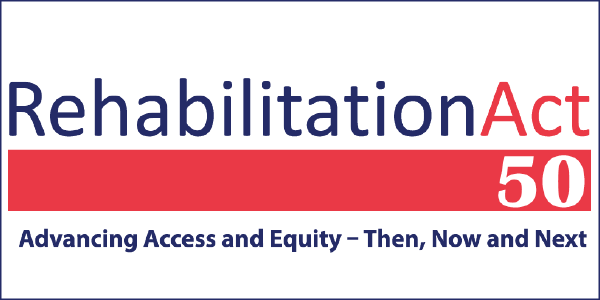Examining 50 years of the Rehabilitation Act of 1973- Advancing Access and Equity for individuals with disabilities
Examining 50 years of the Rehabilitation Act of 1973- Advancing Access and Equity for individuals with disabilities

Each October, we commemorate National Disability Employment Awareness Month (NDEAM) where we celebrate and recognize how workers with disabilities contribute to and advance our economy. This year, we also mark the 50th anniversary of the Rehabilitation Act of 1973 (Rehab Act), the first federal law to address civil rights and equal employment opportunity for people with disabilities.
Since the passage of the Rehab Act in 1973, there have been substantial changes to the legal landscape for workers with disabilities fueled by the advocacy of the disability rights community, often with bipartisan support. Notably, in 1990, the landmark Americans with Disabilities Act was enacted, prohibiting discrimination on the basis of disability in the workplace and mainstreaming the concept of reasonable accommodations. In 1999, the Supreme Court issued the historic decision in Olmstead interpreting the ADA to require public entities to provide qualified individuals with disabilities services in the most integrated setting appropriate to their needs. Finally, since 2014, Section 511 of the Workforce Innovation and Opportunity Act (WIOA) places important limits on the ability of employers to pay subminimum wages to workers with disabilities under section 14(c) certificates.
Today, workers with disabilities have more employment opportunities than ever before, including in a variety of industries and sectors ranging from construction to manufacturing, healthcare and education. Moreover, an increasing number of employers have created opportunities to hire workers with disabilities into competitive, integrated employment.
Whether that work is full-time or part-time, competitive integrated employment means, first, that workers with disabilities are compensated at or above minimum wage and receive comparable pay to employees without disabilities performing similar duties and with similar training and experience. Second, that disabled workers receive the same level of benefits provided to other employees without disabilities in similar positions. Third, that workers with disabilities work at a location where they interact with employees with and without disabilities. And finally, that disabled workers have opportunities for advancement similar to other employees without disabilities.
At the Department of Labor, our North Star is building a more accessible and equitable workplace for all, including workers with disabilities. While we have made substantial progress towards fulfilling the promise of access and equity, there’s still room to go. We know that many workers with disabilities are still being paid wages far below the federal minimum wage under section 14(c) certificates. We have been urged by not just advocates but also by numerous oversight entities and advisory groups, ranging from the Government Accountability Office, the National Council on Disability, the U.S. Commission on Civil Rights, to the DOL’s own Advisory Committee on Increasing Competitive Integrated Employment, to carefully review the 14(c) program and prioritize competitive integrated employment.
And that is what we are going to do. The Department of Labor – led by the Office of Disability Employment Policy, the Wage and Hour Division, our Solicitor, and our policy office– is embarking on engaging stakeholders to ensure opportunities for competitive integrated employment and to move toward greater equity and economic security for workers with disabilities. We are launching a comprehensive review of the Section 14(c) program to re-examine its use and future viability. As part of this effort, we want to hear from all of you – and especially individuals with disabilities – about your experiences with the 14(c) program, and what changes are needed to expand equitable employment opportunities for people with disabilities. In the coming weeks we will be engaging with key organizations, stakeholders, and impacted workers directly on these important issues.
The Rehab Act and NDEAM are fundamentally about the notions of access and equity for people with disabilities. We believe that this historic anniversary is the right time to ask this question about the 14(c) program. We want to hear from you about how you have been impacted by changing laws and government policies, access to services and supports, and even shifting social views about what work opportunities people with disabilities are able to take on and in fact deserve. As our Acting Secretary said earlier this week at the White House Disability Policy Forum celebrating the 50th anniversary of the Rehabilitation Act of 1973, we need your thoughts, your ideas, and your partnership to do this right. I couldn’t agree more.
Karlins.Justin…
Thu, 09/28/2023 – 15:53


Comments are closed.